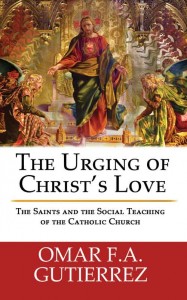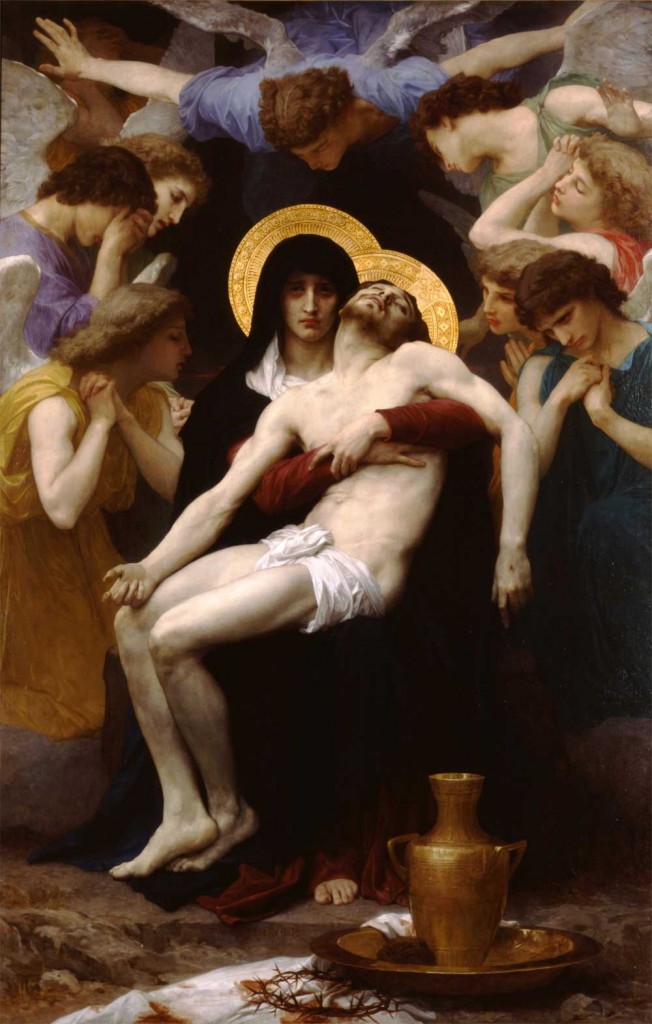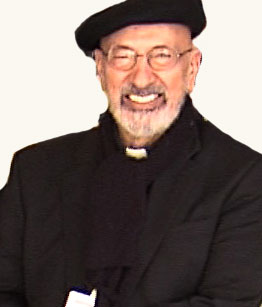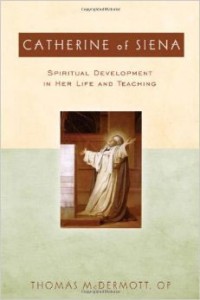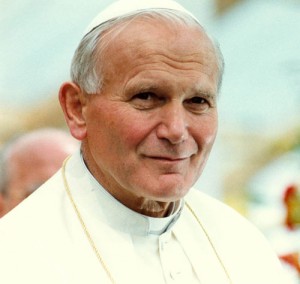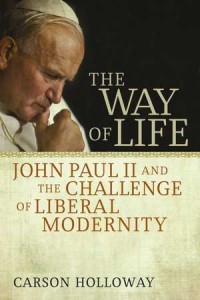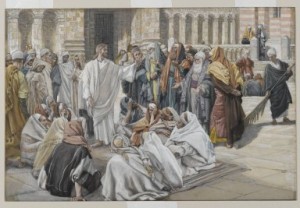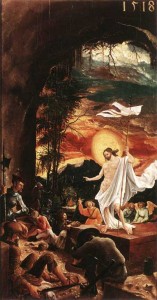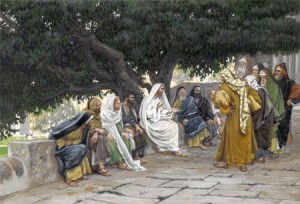Episode 39- Regnum Novum: Bringing forth the New Evangelization through Catholic Social Teaching with Omar Gutierrez  – We continue the study of the “Compendium of the Social Doctrine of the Church” Â Chapter 12 “Social Doctrine and Ecclesial Action”
– We continue the study of the “Compendium of the Social Doctrine of the Church” Â Chapter 12 “Social Doctrine and Ecclesial Action”
[powerpress]
CHAPTER TWELVE
SOCIAL DOCTRINE AND ECCLESIAL ACTION
I. PASTORAL ACTION IN THE SOCIAL FIELD
a. Social doctrine and the inculturation of faith
b. Social doctrine and social pastoral activity
c. Social doctrine and formation
d. Promoting dialogue
e. The subjects of social pastoral activity
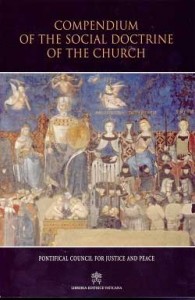
We live at a very special time. The confluence of many things has brought forth the clear need to be able to articulate the Social Teaching of the Catholic Church in a way that is accessible and applicable. This is not to be an effort where high-minded theories are to be bandied about. Rather, this is a time of opportunity wherein we can apply the Social Doctrine to the concrete so as to bring about a New Kingdom, a Revolution. – Omar G.
Also visit Omar’s “Discerning Hearts” page Catholic Social Teaching 101
You can find Omar Gutierrez’s book here
In The Urging of Christ’s Love Omar Gutiérrez tells the stories of eleven people who lived their lives in pursuit of Christ Jesus. Each Saint, Blessed or Servant of God is considered in the context of Catholic Social Teaching. Then at the end of each chapter a prayer is offered and quotes from the Compendium of the Social Doctrine of the Church are provided in order to link the lessons we can learn from the saint’s life to Church teaching. By discovering some new saint friends, and rediscovering some old ones, The Urging of Christ’s Love presents Catholic Social Teaching in an accessible and important way.
Tags: catholic, catholic podcast, catholic prayer
This entry was posted on Monday, April 14th, 2014 at 3:45 pm
You can follow any responses to this entry through the RSS 2.0 feed.
Fr. James Rafferty and Deacon James Keating offered a Lenten Morning of Reflection on behalf of the Institute for Priestly Formation entitled “Into Your Hands I Commend My Spiritâ€.
William-Adolphe Bouguereau’s “Pieta” was used as the vocal point for reflection, as well as the following passages:
From  John 3:16-17
For God so loved the world that he gave*Â his only Son, so that everyone who believes in him might not perish but might have eternal life.k17For God did not send his Son into the world to condemn*Â the world, but that the world might be saved through him.l
Excerpts from Pope Francis’ encyclical “Light of Faith“:
Our culture has lost its sense of God’s tangible presence and activity in our world. We think that God is to be found in the beyond, on another level of reality, far removed from our everyday relationships. But if this were the case, if God could not act in the world, his love would not be truly powerful, truly real, and thus not even true, a love capable of delivering the bliss that it promises. It would make no difference at all whether we believed in him or not. Christians, on the contrary, profess their faith in God’s tangible and powerful love which really does act in history and determines its final destiny: a love that can be encountered, a love fully revealed in Christ’s passion, death and resurrection.
Yet it is precisely in contemplating Jesus’ death that faith grows stronger and receives a dazzling light; then it is revealed as faith in Christ’s steadfast love for us, a love capable of embracing death to bring us salvation. This love, which did not recoil before death in order to show its depth, is something I can believe in; Christ’s total self-gift overcomes every suspicion and enables me to entrust myself to him completely.
- Fr. James Rafferty, S.T.D. Director of Programs and Mission
- Deacon James Keating, Ph.D. Director of Theological Formation
Tags: catholic, catholic podcast, catholic prayer
This entry was posted on Monday, April 14th, 2014 at 6:42 am
You can follow any responses to this entry through the RSS 2.0 feed.
“Extravagant love for Jesus“
[powerpress]
an excerpt from today’s reflection by Don Schwager: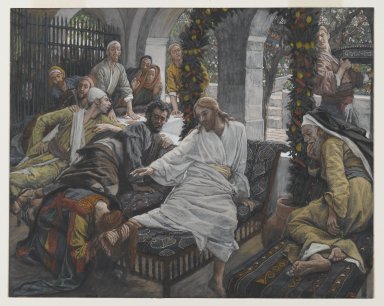
Do you know the love that knows no bounds? As Jesus dines with his beloved friends, Mary does something which only love can do. She took the most precious thing she had and spent it all on Jesus. Her love was not calculated but extravagant. Mary’s action was motivated by one thing, and one thing only, namely, her love for Jesus and her gratitude for God’s mercy. She did something, however, a Jewish woman would never do in public. She loosed her hair and anointed Jesus with her tears. It was customary for a woman on her wedding day to bound her hair. For a married woman to loosen her hair in public was a sign of grave immodesty. Mary was oblivious to all around her, except for Jesus. She took no thought for what others would think, but what would please her Lord. In humility she stooped to anoint Jesus’ feet and to dry them with her hair. How do you anoint the Lord’s feet and show him your love and gratitude?
The gospel records that the whole house was filled with the perfume of the ointment. What Mary had done brought sweetness not only in the physical sense, but the spiritual sense as well. Her lovely deed shows the extravagance of love – a love that we cannot outmatch. The Lord Jesus showed us the extravagance of his love in giving the best he had by pouring out his own blood for our sake and by anointing us with his Holy Spirit. The Apostle Paul says that nothing will be able to separate us from the love of God in Christ Jesus (Romans 8:39). Do you allow the love of Christ to rule in all your thoughts and intentions, and in all your words and deeds?
Why was Judas critical of Mary’s lovely deed? Judas viewed her act as extravagant wastefulness because of greed. A person views things according to what it inside the heart and soul. Judas was an embittered man and had a warped sense of what was precious and valuable, especially to God. Jesus had put Judas in charge of their common purse, no doubt because he was gifted in financial matters. The greatest temptation we can face will often come in the area of our greatest strength or gifting. Judas used money entrusted to him for wrong and hurtful purposes. He allowed greed and personal gain to corrupt his heart and to warp his view of things. He was critical towards Mary because he imputed unworthy motives. Do you examine your heart correctly when you impute wrong or unworthy motives towards others?
“Give us, Lord, a lively faith, a firm hope, a fervent charity, a love of you. Take from us all lukewarmness in meditation, dullness in prayer. Give us fervor and delight in thinking of you and your grace, your tender compassion towards me. The things we pray for, good Lord, give us grace to labor for: through Jesus Christ our Lord.” (Prayer of Sir Thomas More, 16th century)
for the full reflection visit : Daily Reading and Meditation
Tags: catholic, catholic podcast, catholic prayer
This entry was posted on Monday, April 14th, 2014 at 6:41 am
You can follow any responses to this entry through the RSS 2.0 feed.
At The Procession With Palms – Gospel  MT 21:1-11
and came to Bethphage on the Mount of Olives,
Jesus sent two disciples, saying to them,
“Go into the village opposite you,
and immediately you will find an ass tethered,
and a colt with her.
Untie them and bring them here to me.
And if anyone should say anything to you, reply,
‘The master has need of them.’
Then he will send them at once.â€
This happened so that what had been spoken through the prophet
might be fulfilled:
Say to daughter Zion,
“Behold, your king comes to you,
meek and riding on an ass,
and on a colt, the foal of a beast of burden.â€
The disciples went and did as Jesus had ordered them.
They brought the ass and the colt and laid their cloaks over them,Â

and he sat upon them.
The very large crowd spread their cloaks on the road,
while others cut branches from the trees
and strewed them on the road.
The crowds preceding him and those following
kept crying out and saying:
“Hosanna to the Son of David;
blessed is the he who comes in the name of the Lord;
hosanna in the highest.â€
And when he entered Jerusalem
the whole city was shaken and asked, “Who is this?â€
And the crowds replied,
“This is Jesus the prophet, from Nazareth in Galilee.â€
Tags: Jesus, John Esseff, Mount of Olives
This entry was posted on Monday, April 14th, 2014 at 5:27 am
You can follow any responses to this entry through the RSS 2.0 feed.
Episode 7 – Taking Up Our Cross… – Sixth Week
In “The Power of the Cross”, Michael Dubruiel penned a truly exceptional meditation on the Cross of Christ which  serves beautifully as a source for reflection any time of the year, but it is particularly poignant and compelling during the weeks of Lent. Several years ago Bruce and I had the chance to have a series of conversations with Michael during Lent using his book for reflection…it was a big hit with the audience. Those discussions have been remastered and made available once again here. Michael died unexpectedly in February of 2009, but his gifts continue to be shared through his books and many other venues, and hopefully through this humble portal. The sentiments and teachings Michael offers is truly timeless.
serves beautifully as a source for reflection any time of the year, but it is particularly poignant and compelling during the weeks of Lent. Several years ago Bruce and I had the chance to have a series of conversations with Michael during Lent using his book for reflection…it was a big hit with the audience. Those discussions have been remastered and made available once again here. Michael died unexpectedly in February of 2009, but his gifts continue to be shared through his books and many other venues, and hopefully through this humble portal. The sentiments and teachings Michael offers is truly timeless.
[powerpress]
Episode 7 – Taking Up Our Cross… – Michael discusses:
Day 35 – In Abondenment
Day 36 – In Reverance
Day 37 – To Follow the Lord
Day 38 – Be Prepared
Day 39 – In Imitation of Christ
Day 40 – To Stay with Jesus
Day 41 – Be Not Afraid
Michael’s wife, author Amy Welborn, has made “The Power of the Cross” available as a free e-book available over the internet ! Â I HIGHLY encourage you to download this exceptional work…there also plans to make it once again available as a paperback book.
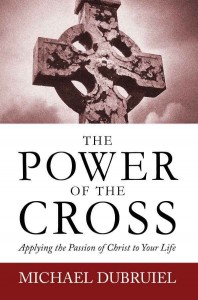 The Power of the Cross is now available as a free e-book,
The Power of the Cross is now available as a free e-book,
check out more information by going here
Check out more at the Discerning Hearts’ Michael Dubruiel page
Tags: michael dubruiel, The Power of the Cross
This entry was posted on Sunday, April 13th, 2014 at 12:48 am
You can follow any responses to this entry through the RSS 2.0 feed.
“I am the Son of God”
[powerpress]
an excerpt from today’s reflection by Don Schwager: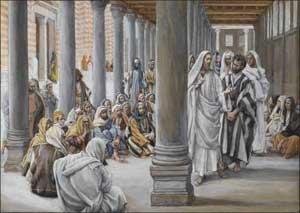
Is your life consecrated to God? The scriptural understanding of consecration is to make holy for God – to be given over as a free-will offering and sacrifice for God. Jesus made himself a sin-offering for us, to ransom us from condemnation and slavery to sin. He spoke of his Father consecrating him for this mission of salvation. Why were the religious leaders so upset with Jesus that they wanted to kill him? They charged him with blasphemy because he claimed to be the Son of God. Jesus made two claims in his response: He was consecrated by the Father to a special task and he was sent into the world to carry out his Father’s mission. Jesus challenged his opponents to accept his works if they could not accept his words. One can argue with words, but deeds are beyond argument. Jesus is the perfect teacher in that he does not base his claims on what he says but on what he does. The word of God is life and power to those who believe. Jesus shows us the way to walk the path of truth and holiness. And he anoints us with his power to live the gospel with joy and to be his witnesses in the world. Are you a doer of God’s word, or a forgetful hearer only?
“Write upon my heart, O Lord, the lessons of your holy word, and grant that I may be a doer of your word, and not a forgetful hearer only.”
for the full reflection visit : Daily Reading and Meditation
Tags: catholic, catholic podcast, catholic prayer
This entry was posted on Friday, April 11th, 2014 at 12:08 am
You can follow any responses to this entry through the RSS 2.0 feed.
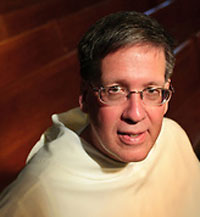 Episode 6 St. Catherine of Siena: Her Life and Teachings with Fr. Thomas McDermott
Episode 6 St. Catherine of Siena: Her Life and Teachings with Fr. Thomas McDermott
[powerpress]
 In this episode, Fr. McDermott aids in our understanding of St. Catherine’s teachings on the “Blood of Christ” and it’s context from Sacred Scripture and Medieval sensibilities.  He discusses “The Christ Bridge” as a central image in St. Catherine’s writings one’s spiritual journey.  The flowering of baptismal grace is exemplified in this teaching.
In this episode, Fr. McDermott aids in our understanding of St. Catherine’s teachings on the “Blood of Christ” and it’s context from Sacred Scripture and Medieval sensibilities.  He discusses “The Christ Bridge” as a central image in St. Catherine’s writings one’s spiritual journey.  The flowering of baptismal grace is exemplified in this teaching.
Fr. Thomas McDermott, OP is Regent of Studies for the Dominican Province of St. Albert the Great and is the author of “Catherine of Siena: Spiritual Development in Her Life and Teaching” (Paulist, 2008) and “Filled with all the Fullness of God: An Introduction to Catholic Spirituality”. He obtained a doctorate in spiritual theology from the Angelicum and taught for several years at Kenrick-Glennon Seminary in St. Louis. He crrently serves as pastor at St. Vincent Ferrer, in Chicago, IL.
Tags: McDermott, st catherine of siena, Thomas McDermott
This entry was posted on Thursday, April 10th, 2014 at 5:00 pm
You can follow any responses to this entry through the RSS 2.0 feed.
WOL3 – Episode 3 -The influence of Thomas Hobbes and his role as the father of modern-day liberalism.  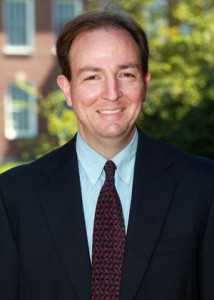 Absolute monarchy and the tyranny of “unlimited” government.  The difference between Divine-right monarchy and Absolute monarchy, and the legitimacy thought behind “dictatorship”.  How this affects ruling systems in history, and it’s influence on the “Culture of Death”.  Who was John Locke?  The Law of Nature and it’s obligations according to Locke’s thought.  The fundamental rule to preserve oneself.  Bl. John Paul’s response to that thought…to respect the moral law and give of oneself.
Absolute monarchy and the tyranny of “unlimited” government.  The difference between Divine-right monarchy and Absolute monarchy, and the legitimacy thought behind “dictatorship”.  How this affects ruling systems in history, and it’s influence on the “Culture of Death”.  Who was John Locke?  The Law of Nature and it’s obligations according to Locke’s thought.  The fundamental rule to preserve oneself.  Bl. John Paul’s response to that thought…to respect the moral law and give of oneself.
[powerpress]
The Way of Life, Carson Holloway examines the fundamental philosophers of modernity-from Hobbes to Toqueville-to suggest that John Paul II’s critique of modernity is intended not to reject, but to improve. Thus, claims Holloway, it is appropriate for liberal modernity to attend to the Pope’s thought, receiving it not as the attack of an enemy but as the criticism of a candid friend.
 Â
For other episodes in the series visit Dr. Holloway’s Discerning Hearts page
This series is based on Dr. Holloway’s book “The Way of Life”
Tags: catholic, catholic podcast, catholic prayer
This entry was posted on Thursday, April 10th, 2014 at 1:43 pm
You can follow any responses to this entry through the RSS 2.0 feed.
 Episode 14- Seeking Truth with Sharon Doran -Announcement of the Kingdom Of God (PART 2)
Episode 14- Seeking Truth with Sharon Doran -Announcement of the Kingdom Of God (PART 2)
[powerpress]
Episode 14 –
Call of the Apostles (part 2)
“Go away from me Lord, for I am a sinful man.â€
These are the words of Peter when he realizes he is in the presence of the Lord. But as Sharon teaches us tonight, Jesus is not afraid of sin and he stays, calling Peter on to become the Rock upon which he will build his Church. In what can only be described as a moving and anointed lecture, Sharon describes the call of the Apostles and the creation of the Apostolic succession that extends to our modern times. Jesus commanded these fishers of men to “Cast out into the deep and let down your nets for a catch.†This too is our call: to grow ever deeper in relationship with our Lord.
Sharon Doran serves as the teaching director of “Seeking Truth.†An experienced Bible Study teacher, Sharon has a passion for scripture that will motivate and challenge you to immerse yourself in God’s Word and apply His message to your every day life.
 “Seeking Truth†is an in depth Catholic Bible Study, commissioned by the Archdiocese of Omaha in response to John Paul II’s call to the New Evangelization as well as Pope Benedict XVI’s exhortation for all Catholics to study scripture. To learn more go to:www.seekingtruth.net
“Seeking Truth†is an in depth Catholic Bible Study, commissioned by the Archdiocese of Omaha in response to John Paul II’s call to the New Evangelization as well as Pope Benedict XVI’s exhortation for all Catholics to study scripture. To learn more go to:www.seekingtruth.net
Tags: kingdom of god, Sharon, Sharon Doran, Sharon Doran Episode 14
This entry was posted on Thursday, April 10th, 2014 at 1:16 am
You can follow any responses to this entry through the RSS 2.0 feed.
[powerpress]
an excerpt from today’s reflection by Don Schwager:
Jesus challenged the people of Israel to accept his word as the very revelation of God himself. His claim challenged the very foundation of their belief and understanding of God. Jesus made a series of claims which are the very foundation of his life and mission. What are these claims? First, Jesus claims unique knowledge of God as the only begotten Son of the Father in heaven. Since he claims to be in direct personal communion with his Father in heaven, he knows everything about the Father. Jesus claims that the only way to full knowledge of the mind and heart of God is through himself. Jesus also claims unique obedience to God the Father. He thinks, lives and acts in the knowledge of his Father’s word. To look at his life is to “see how God wishes me to live.” In Jesus alone we see what God wants us to know and what he wants us to be.
When the Jewish authorities asked Jesus who do you claim to be? he answered, “before Abraham was, I am.” Jesus claims to be timeless and there is only one in the universe who is timeless, namely God. Scripture tells us that “Jesus Christ is the same yesterday and today and forever” (Hebrews 13:8). Jesus was not just a man who came, lived, died, and then rose again. He is the immortal timeless One, who always was and always will be. In Jesus we see the eternal God in visible flesh. He is God who became a man for our sake and for our salvation. His death and resurrection make it possible for us to share in his immortality. Do you believe the words of Jesus and obey them with all your heart, mind, and strength?
“Lord Jesus, let your word be on my lips and in my heart that I may walk in the freedom of your everlasting love, truth and goodness.”
for the full reflection visit : Daily Reading and Meditation
Tags: catholic, catholic podcast, catholic prayer
This entry was posted on Thursday, April 10th, 2014 at 12:06 am
You can follow any responses to this entry through the RSS 2.0 feed.
USCCA38 Â Chapter 30 -Â Marital Fidelity pt 1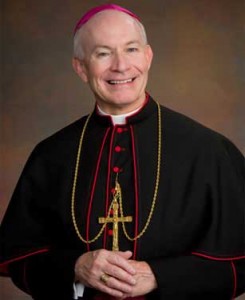
[powerpress]
Archbishop Lucas offers insights on the US Catholic Catechism for Adults Chapter 30:
The Catechism states that sexuality involves the whole person. “Sexuality affects all aspects of the human person in the unity of his body and soul. It especially concerns affectivity, the capacity to love and to procreate, and in a more general way the aptitude for forming bonds of communion with others†(CCC, no. 2332).
The Sixth Commandment summons spouses to practice permanent and exclusive fidelity to one another. Emotional and sexual fidelity are essential to the commitment made in the marriage covenant. God established marriage as a reflection of his fidelity to us. The vows made by the spouses at their wedding to be faithful to one another forever should witness the very covenant God has made with us.
United States Conference of Catholic Bishops (USCCB) (2012-04-02). United States Catholic Catechism for Adults (Kindle Locations 5856-5861). United States Conference of Catholic Bishops (USCCB). Kindle Edition.
The Most Reverend George J. Lucas leads the Archdiocese of Omaha.Â
For other episodes in the visit our Archbishop George Lucas page
This programs is based on:
More information can be found here.
We wish to thank the USCCB for the permissions granted for use of  relevant material used in this series.
[ezcc]
Tags: Catechism, Catholic Catechism, George Lucas
This entry was posted on Wednesday, April 9th, 2014 at 3:22 pm
You can follow any responses to this entry through the RSS 2.0 feed.
Is Jesus Calling? A Spiritual Guide to Discerning Your Vocational Call with Fr. Paul Hoesing – episode 7: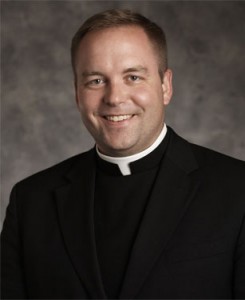 Â It’s all about relationship. Â What to do now.
 It’s all about relationship.  What to do now.
[powerpress]
1. Go to Mass, if possible, daily Mass
2. The sacrament of confession
3. Daily Prayer
4. Â Talk to a priest
5. Â Read the Gospels
6. Â Devotion to the Blessed Virgin Mary, the Mother of God
7. Â Eucharistic adoration
8. Â Live a life of virtue
9. Â Spiritual reading
10. Â Hang around good people
Based on “Is Jesus Calling You To Be A Catholic Priest: A helpful guide”, published by National Conference of Diocesan Vocation Director.
Fr. Paul Hoesing serves as the Vocation Director for the Archdiocese of Omaha, NE.
Check out “For Your Vocation.org“
Tags: Paul Hoesing
This entry was posted on Wednesday, April 9th, 2014 at 7:05 am
You can follow any responses to this entry through the RSS 2.0 feed.
“The truth will make you free”
an excerpt from today’s reflection by Don Schwager:
True and false sources of identity
The scribes and Pharisees, who were the religious authorities of the Jews, questioned Jesus’ authority to speak and act in God’s name. They questioned Jesus’ claim to forgive sins and to set people free from slavery to sin. They understood that only God had power to forgive sins and to release people from their burden of guilt and shame. They refused to accept that Jesus’ authority was given to him by his Father in heaven. Jesus tells them that they think evil of him and desire to kill him because they are under the influence and power of the “father of lies” who is opposed to the one true Father and Creator who made us in his image and likeness (Genesis 1:26-27).
Jesus explains that he is speaking of two different senses of “fatherhood”. The first is a physical identity through natural fatherhood. And the second and more significant identity is a self-chosen one that is the result of being led and formed in a moral way of thinking and living one’s life that has been shaped through the example, words, and influence of someone we are consciously or unconsciously following and imitating.
We do not grow or learn in a vacuum. We are shaped for better or for worse by those we choose to imitate and follow. Sin leads us away from God’s truth and the help he gives us to follow him. Slavery to sin is ultimately rooted in the father of lies (John 8:44), whom Scripture calls the devil (Luke 4:1) and Satan (Luke 10:18), the ruler of this present world who is opposed to God (John 12:31; 2 Corinthians 4:4).
True freedom comes from God
The freedom which Jesus offers his followers is freedom from the power of sin, Satan, and the worldly influence of those who oppose God and his ways. We are powerless to set ourselves free from bondage to Satan, sin, and death (Romans 3:23; 5:6). That is why the Lord Jesus took our sins upon himself and nailed them to the cross (1 Peter 2:24; Isaiah 53:5-6; Colossians 2:14). His death on the cross has won victory and pardon for us, and peace with God. Through Jesus’ sacrifice we are not only forgiven and reconciled with God – we become the adopted sons and daughters of God (Romans 8:14-16). We can call God our Father because the Lord Jesus has reconciled us and redeemed us from slavery to sin and Satan.
A redeemed slave is not entirely free until all of his chains and weights have been broken and destroyed. The Lord Jesus alone has the power to release us from every chain and burden that would keep us in bondage to sinful habits and hurtful desires. Are there any chains – any sinful patterns, harmful attitudes, and addictive behavior – that you need to be released from? Allow the Lord Jesus to unbind you and bring you healing, pardon, and freedom to walk in his way of love and truth. The Lord Jesus sets us freefrom slavery to our own selfishness and sinful desires in order to set us free for a joy-filled life of love and service for his kingdom. Paul the Apostle reminds us that Christ has won freedom for each one of us – not to serve ourselves or do as we please – but rather to please the Lord and to serve our neighbors in love for their sake (Galatians 5:1,13). Do you accept and believe Christ’s word of truth, love, and freedom for your life?
“Lord Jesus, write your words of love and truth upon my heart and make me a diligent student and a worthy disciple of your word.”
for the full reflection visit : Daily Reading and Meditation
Tags: Lord Jesus
This entry was posted on Wednesday, April 9th, 2014 at 12:07 am
You can follow any responses to this entry through the RSS 2.0 feed.
Episode 23 – The Holy Rule of St. Benedict: A Spiritual Path for Today’s World with Fr. Mauritius Wilde O.S.B., PhD.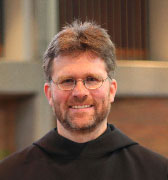
Prayer during the Night
[powerpress]
From the Holy Rule of St. Benedict:
CHAPTER 8
Of the Divine Office during the Night
Making due allowance for circumstances, the brethren will rise during the winter season, that is, from the calends of November till Easter, at the eighth hour of the night; so that, having rested till a little after midnight, they may rise refreshed. The time, however, which remains over after the night office (Matins) will be employed in study by those of the brethren who still have some parts of the psalms and the lessons to learn.
But from Easter to the aforesaid calends, let the hour for celebrating the night office (Matins) be so arranged, that after a very short interval, during which the brethren may go out for the necessities of nature, the morning office (Lauds), which is to be said at the break of day, may follow presently.
Father Mauritius Wilde, OSB, Ph.D., did his philosophical, theological and doctoral studies in Europe. He is the author of several books and directs retreats regularly. He serves as Prior of our monastery in Schuyler.
 For more information about the ministry of the the Missionary Benedictines of Christ the King Priory in Schuyler, Nebraska visit here:
For more information about the ministry of the the Missionary Benedictines of Christ the King Priory in Schuyler, Nebraska visit here:
Tags: Holy Rule of St. Benedict, Mauritius
This entry was posted on Tuesday, April 8th, 2014 at 2:17 pm
You can follow any responses to this entry through the RSS 2.0 feed.
What a delight to talk with Simcha Fisher! She is one of the most intriguing, engaging, and truly authentic Catholic writers out there today.  Her blogging for the National  Catholic Register is a stand out for their online features, and her Patheos blog “I Have to Sit Down” is one of my all-time favorites  (I highly encourage bookmarking it).  It’s a joy to be able to heartily recommend “The Sinner’s Guide to Natural Family Planning“!  Far from being just a critical examination of the topic, this book reads more like a conversation with a good friend at a coffee house.  All issues on are the table and thoughtfully discussed.  Wherever you find yourself on the subject, respect and encouragement is the order of the day.  Challenges are acknowledged and addressed by Simcha, who delivers time tested wisdom that is only garnered from a lived faith and years of experience.  Everyone should be reading this book, not just young married couples, but also priest, deacons, religious, and couples engaged in the conversations that shape our culture today.
Catholic Register is a stand out for their online features, and her Patheos blog “I Have to Sit Down” is one of my all-time favorites  (I highly encourage bookmarking it).  It’s a joy to be able to heartily recommend “The Sinner’s Guide to Natural Family Planning“!  Far from being just a critical examination of the topic, this book reads more like a conversation with a good friend at a coffee house.  All issues on are the table and thoughtfully discussed.  Wherever you find yourself on the subject, respect and encouragement is the order of the day.  Challenges are acknowledged and addressed by Simcha, who delivers time tested wisdom that is only garnered from a lived faith and years of experience.  Everyone should be reading this book, not just young married couples, but also priest, deacons, religious, and couples engaged in the conversations that shape our culture today.
[powerpress]
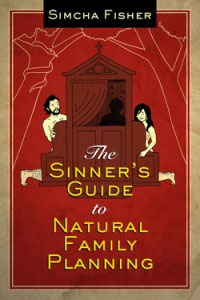 You can find the book here
You can find the book here
Simcha speaks … with honesty along with the wit and wisdom that always make her teachings so memorable and helpful. She summons all of us to trust, mutual patience and kindness, and to a joyful honesty about NFP. —Msgr. Charles Pope, Pastor of Holy Comforter – St. Cyprian Parish, Washington, DC
Before The Sinner s Guide to NFP, the only way you could get this kind of candor on the subject of Natural Family Planning was in private conversations with your best friend. Simcha has taken all the things we think about NFP but feel like we can t say, brought them into the light, and addressed them with insight and razor-sharp wit. You ll laugh, you ll nod your head in recognition, and you ll ultimately walk away inspired by the kind of encouragement that only someone else in the trenches can offer. —Jennifer Fulwiler of Conversion Diary
Tags: catholic, catholic podcast, catholic prayer
This entry was posted on Tuesday, April 8th, 2014 at 1:37 pm
You can follow any responses to this entry through the RSS 2.0 feed.


